Prepare For Breastfeeding
- Home
- Breastfeeding
- How to Breastfeed
- Learning to Breastfeed
- Prepare for Breastfeeding
The most important thing you can do to prepare for breastfeeding is believe you can do it!
Planning for your breastfeeding journey might include setting short and long-term goals.

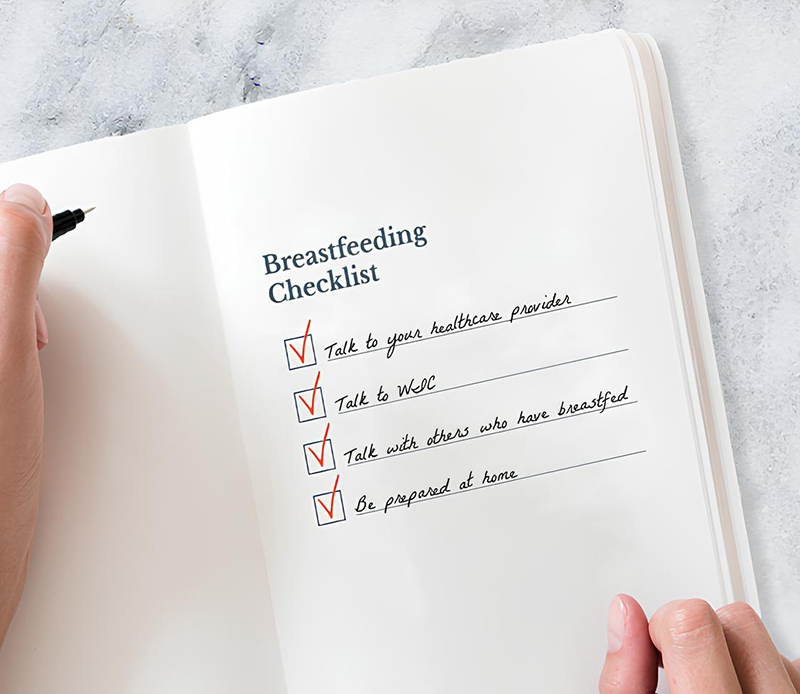

When your baby is born, they are ready to cuddle and eat. Practice skin-to-skin in the hospital and at home. They will be hungry within a few hours of their birth.
Breastfeeding takes practice. The more comfortable you are, the easier it will be. Find what works best for you and your baby.
Your baby may not want to be held the same way at each feeding. Try different holds until you find what is comfortable for your baby.

Your baby may not want to be held the same way at each feeding. Try different holds until you find what is comfortable for your baby.
Listen to your body when you are feeling stressed. Take care of and be kind to yourself. Find ways to ease the stress you’re feeling.

Surround yourself with supportive people
Raising a child is a lot of work! Let family and friends help you with housework or hold your baby while you sleep, rest, or take a bath. Chances are they want to help, and you deserve a break! In the same way, give yourself space away from people who say or do negative things that lead to you feeling stressed.
Relax
Find a quiet, comfortable, relaxing place to nurse. Feeling relaxed when breastfeeding is more enjoyable for you and your baby. Use this time to bond with your baby, listen to calming music, meditate, or read. Breastfeeding can help you relax and handle stress better. Skin-to-skin contact with your baby has a natural soothing effect.


Sleep
It’s important to get enough rest so you feel refreshed. Sleep helps you feel better and stay strong. It also gives you the energy to take care of your baby and keeps your immune system working well. Plus, getting enough sleep helps your mood and makes it easier to handle the challenges of being a new mom.
Get moving
Physical activity improves your mood. When you exercise, your body makes certain hormones that can help relieve stress. Try a walk around the block and ask your healthcare provider when you can return to strenuous exercise after giving birth.


Get help from a professional
A therapist can help you work through stress and find positive ways to deal with problems. Reach out to WIC to help find the support you need.
Continue to nurse on-demand, about 4-6 times in 24 hours.
Babies may experience a growth spurt around 6 months of age and may feed more often.
Offer breast milk in a cup.
24-32 oz. per day of infant formula.
Offer formula in a cup.




Breast milk is the most important source of nutrition for your baby, even after you start offering solid foods.
Continue to nurse on-demand, 3 or more times per day.
16-24 oz. per day. Offer in a cup.
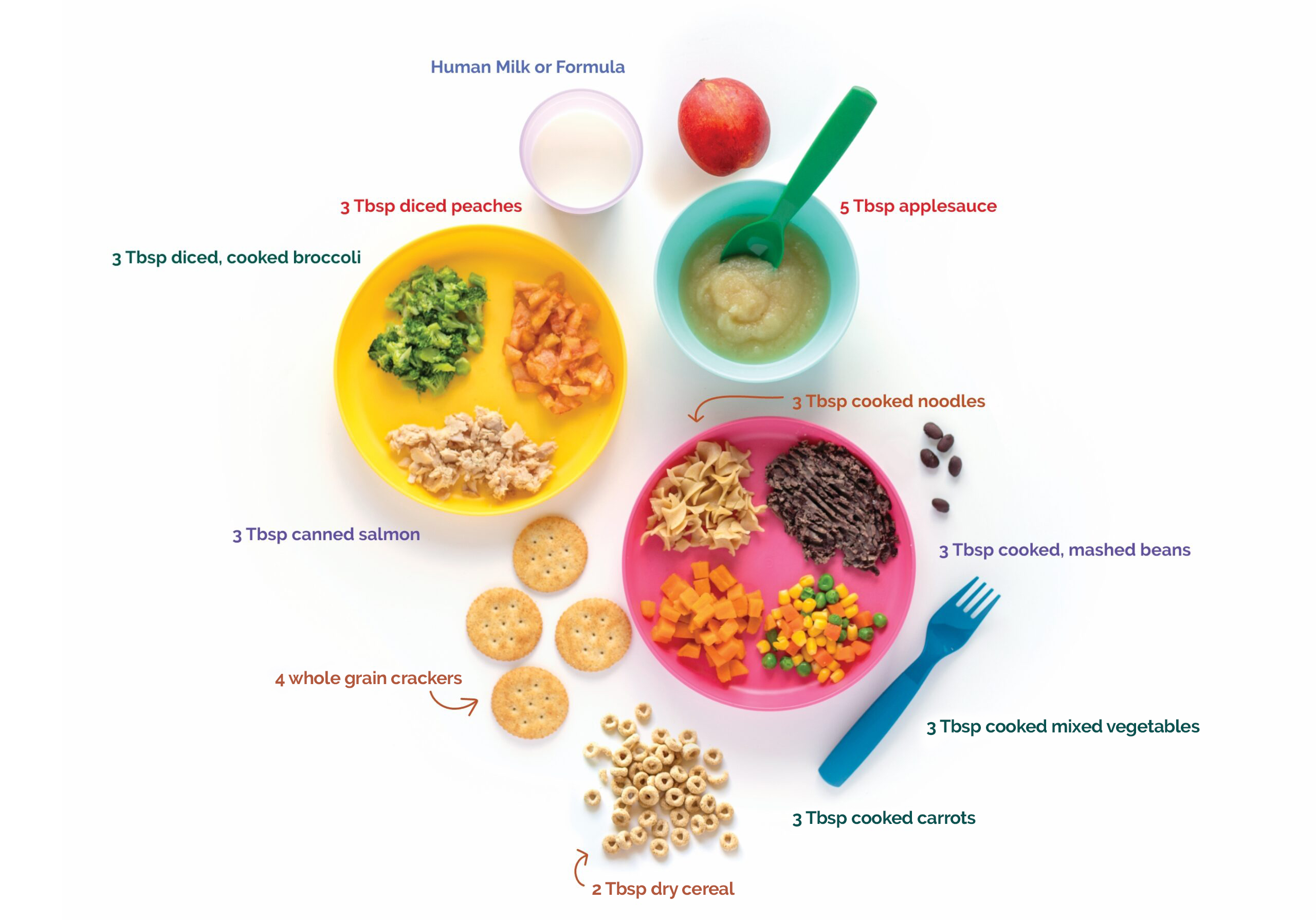
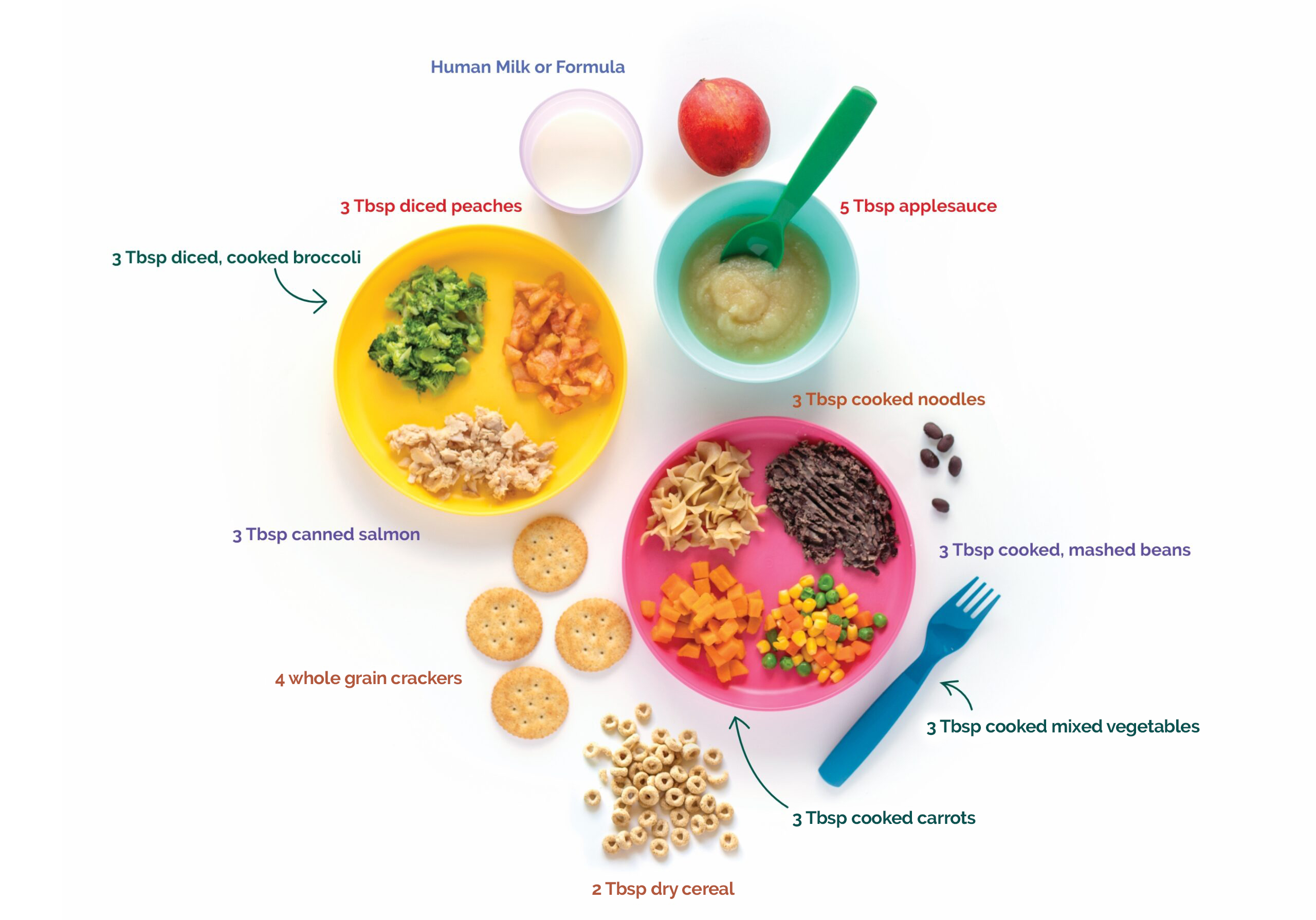
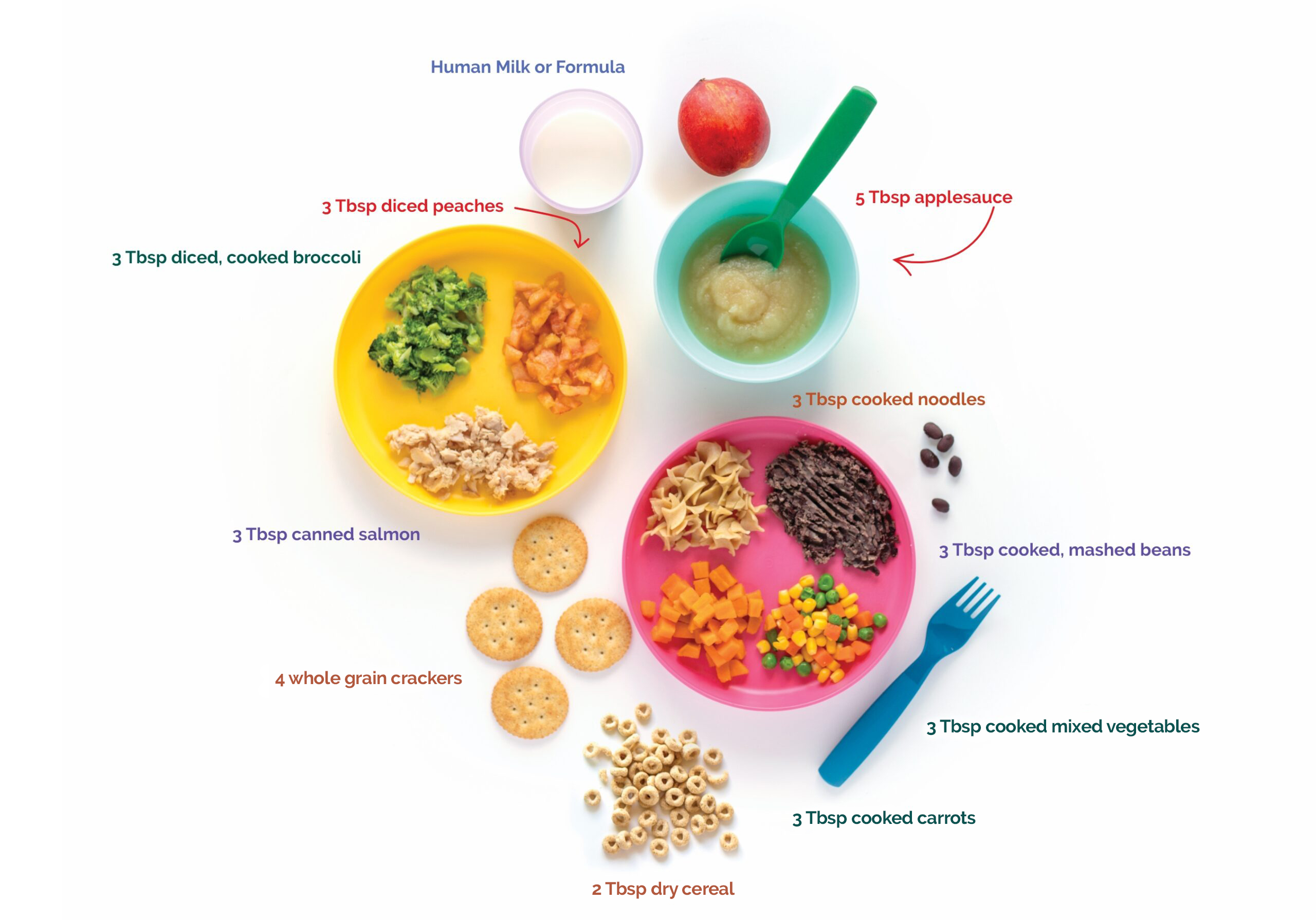
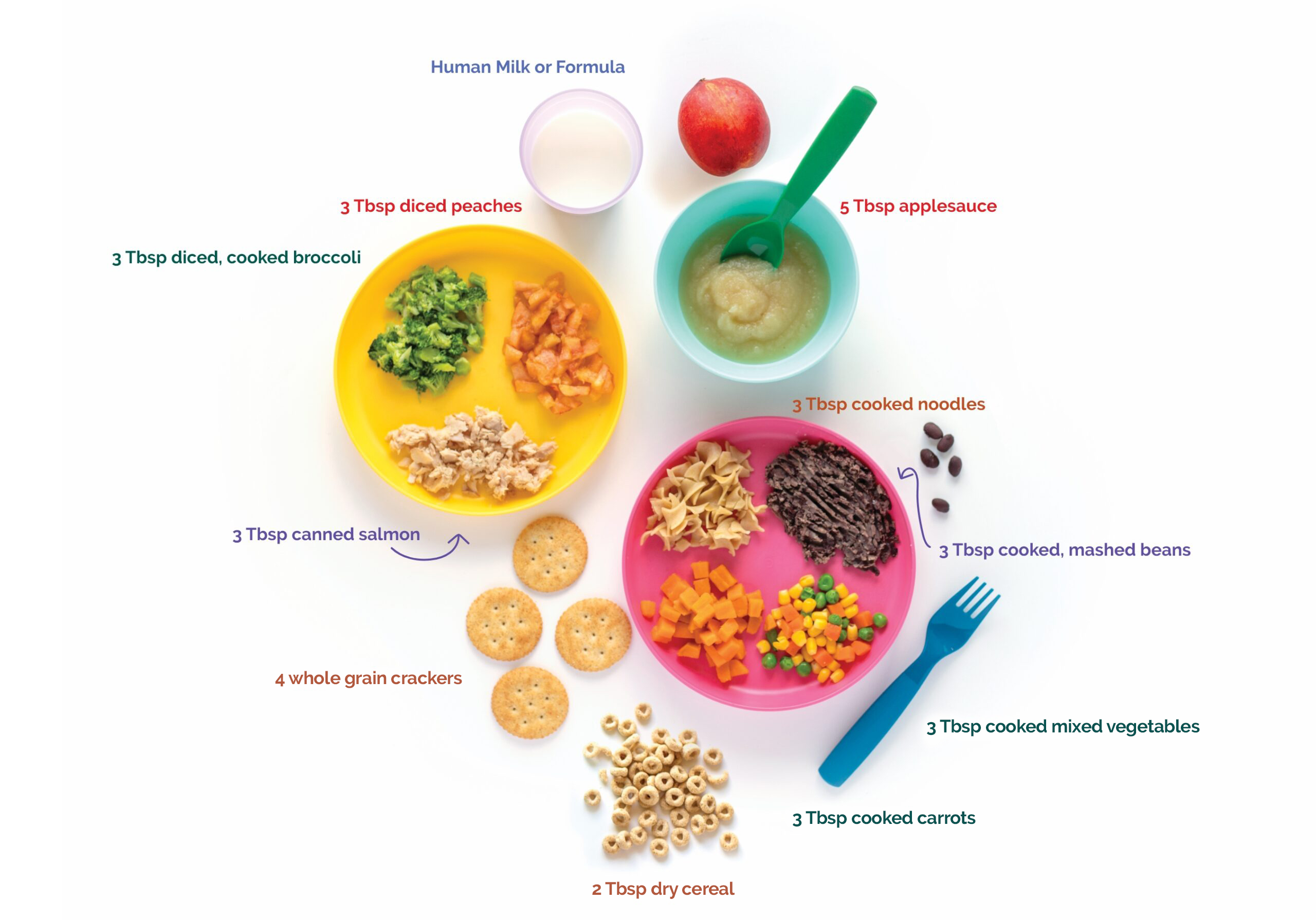
Feed solids with a spoon. Never put cereal in a bottle.
Continue nursing on-demand, at least 4 times in 24 hours.
If your baby seems less interested in nursing after you introduce solids, try nursing before you offer solids.
Offer breast milk in a cup.
24-32 oz. per day.
Offer formula in a cup.
4-8 Tbsp. per day.
Plain iron-fortified infant cereals.
Plain rice or pasta.
Baby crackers, small pieces of bread, or soft tortillas.

8-12 Tbsp. per day.
Plain cooked vegetables, mashed with a fork.

8-12 Tbsp. per day.
Peeled soft fruit in bite-size pieces.
Unsweetened canned fruit.

4-8 Tbsp. per day.
Finely ground, chopped, or diced meats, poultry, eggs, fish, or cooked mashed beans.
Cottage cheese or mild cheese.
Thinned, smooth peanut or nut butter.


Around 2-3 weeks, 6 weeks, 3 months, and 6 months of age, babies may experience a growth spurt when they feed more often.
As they grow babies can hold more milk, so feedings may become further apart and take less time.
To prevent choking, always hold your baby when feeding. Never prop up a bottle to feed.
Start offering whole milk when your baby is one year old.
The American Academy of Pediatrics recommends exclusive breastfeeding for the first six months and that breastfeeding continue for at least 12 months and beyond.

Wait to offer solid foods until your baby:
To prevent choking, always hold your baby when feeding. Never prop up a bottle to feed.
Try one new food at a time. Wait 5 days before trying another new food to watch for allergies. Food allergies may include wheezing, rash, or diarrhea.
Introduce peanut butter around 6 months. Mix one teaspoon of peanut butter with breast milk or formula. Make it thin and easy to swallow. Use a spoon to offer a taste of the thinned product. Watch your baby for any reaction for the next 2 hours.
Babies under one year should NOT have honey due to the risk of botulism. Also, babies should not have foods that can cause choking like nuts or whole grapes.
All babies are different. Talk with WIC or your baby’s healthcare provider about your baby’s needs.






Before teeth come in, wipe gums with a soft, clean wash cloth after each feeding, especially before bed.
Nurse your baby on-demand, at least 7-9 times in 24 hours.
When your baby starts teething, they may want to nurse more often.
25-45 oz in 24 hours.
Your baby needs about 4-6 oz of iron-fortified formula every 3-4 hours.
Your baby may start to feed on a schedule. Instead of focusing on fixed amounts, let your baby tell you when they have had enough.
Newborns have tiny tummies and need to be fed often. In the first few weeks, you may need to wake your baby to feed if they sleep longer than 4 hours.
Many babies are fussy during a growth spurt and will want to nurse longer and more often. This is called cluster feeding. This is your baby’s way of helping you increase your milk supply so that you can keep up with their needs. Remember, the more your baby nurses, the more milk your body makes.
Growth spurts can happen at any time, and every baby is different.
They often happen at these ages:

2 to 3 Weeks

6 Weeks

3 Months

6 Months
Breastfeed 8-12 times in 24 hours to help your newborn stay healthy.
Nurse on-demand and when your newborn shows signs of hunger, such as sucking on hands or smacking lips.
In the first few days, newborns need 2-3 oz. of iron-fortified infant formula every 3-4 hours.
By the end of the first month, your newborn needs about 4 oz. every 4 hours.
Feed on-demand and when your newborn shows signs of hunger.